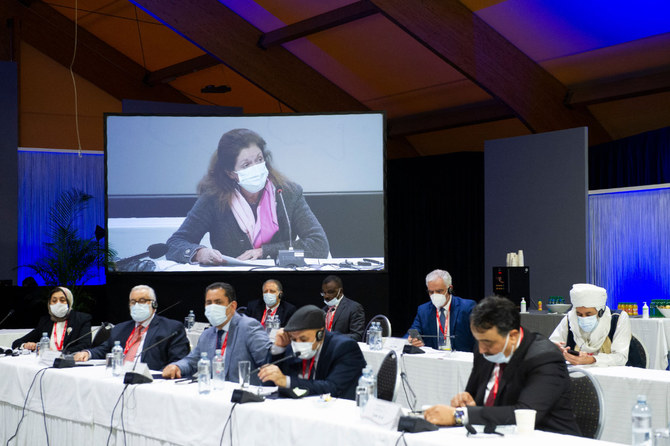NEW YORK: In what could prove to be a landmark moment for Libya, delegates from rival factions in the country on Friday agreed on a new interim leadership that will guide the conflict-hit North African nation toward national elections on Dec. 24.
During a meeting in Geneva, the 74 members of the Libyan Political Dialogue Forum (LPDF) chose a slate of four candidates that included Misrata-based politician and businessman Mohammed Dbeibah, who will be prime minister, and diplomat Mohammed Younes Menfi, from eastern Libya, who will head a three-member Presidential Council. The other members are Moussa Al-Koni, from the south of the country, and Abdallah Hussein Al-Lafi, from the western city of Zuwara.
They triumphed over candidates on a rival list led by Fathi Bashagha, the security chief of the UN-recognized Government of National Accord (GNA), and Aguila Saleh, the head of the eastern-based parliament.
Stephanie Williams, the UN’s acting special representative for Libya, commended the losing candidates for their “gracious concession tweets.”
“This captures the spirit prevailing at the LPDF and in Libya,” she said.
“Let’s be clear: the goal here is national elections,” she stressed as she urged the winners to respect agreed deadlines, including the endorsement of a new government by the parliament within 42 days. Until then, the GNA remains the caretaker government. After that date, all parallel institutions will be considered “null and void.”
“We are moving toward unity here,” added Williams. “The LPDF are determined to make sure that this temporary authority don’t get too comfortable in their seats.
“They (the LPDF) designed the road map in such a manner as to ensure that the deadlines were laid out very clearly in a way that does not give the concerned institutions an eternity to do what is needed in regard to the constitutional basis and electoral legislation. If they fail in this regard, it will return to the LPDF.”
UN Secretary-General Antonio Guterres hailed the selection of the interim leadership as a breakthrough that followed a long process of negotiation that began to bear fruit when the 5+5 Joint Military Commission agreed a ceasefire in October last year.
“The very fact that the ceasefire has been holding, even with a huge military presence and very heavy equipment on both sides, is a signal of hope,” he said after the announcement of the result of the LPDF vote.
“I believe it is a duty of everybody to do everything possible to transform that hope into reality.”
He called on all foreign fighters and mercenaries to “move first to Tripoli and Benghazi and then leave the country,” in accordance with the timeline set by the road map agreed during peace talks in Tunis in November.
“It’s not rocket science,” said Williams. “Those who brought the forces in can take them out.”
Libya descended into civil war after the NATO-backed uprising in 2011 that ousted dictator Muammar Qaddafi. Fighting in recent years pitted the GNA against the forces of eastern military commander Khalifa Haftar. Each side received support from competing regional powers.
Williams said that Haftar was represented at the Geneva talks and that his representatives in the forum supported the political process.
The members of the interim authority are not eligible to stand as candidates in December’s elections. The new unified executive will launch a national reconciliation process “promoting the culture of amnesty and tolerance, in parallel with truth-seeking and reparation,” according to the Tunis road map.
It must also fully implement the ceasefire agreement and reopen the coastal road in the country, which is critical for the delivery of basic services and the free movement of goods and people.
The interim authority is also tasked with preparing for the reunification of Libya’s economic and financial institutions, tackling the dire living conditions many Libyans have been forced to endure, and enacting economic reforms needed to ensure a more equitable distribution of oil revenues in the country, which is a member of OPEC. There have been bitter disputes over this issue in the past, which affected production.
Blockades cut the flow of oil to almost nothing last year before production rebounded to more than 1 million barrels a day after the blockade was lifted in September.
Williams said: “There’s a great deal of momentum in these tracks. The train has left the station; now it is incumbent on the international community to support the decision that the Libyans have taken today.”
The EU, Libya’s main trading partner, pledged to fully support the interim authority.
“This is already an impressive exercise in transparency, compromise, and commitment to national unity and reconciliation,” Jose Antonio Sabadell, the EU’s envoy to Tripoli, said in a message posted on Twitter.
Jan Kubis, who was appointed the UN’s special envoy to Libya last month, will now take over from Williams, who thanked her predecessor, Ghassan Salame, for initiating the current intra-Libyan peace process.
She concluded by once again calling on the international community, which united in support during the Berlin International Conference on Libya in January last year, to continue to support the Libyan people, listen to them and reinforce their decisions.
She added: “We have accompanied (the Libyans) on this journey, a journey that at the end of the road is national elections, Dec. 24 this year — and that is really a solemn obligation that everybody needs to work to fulfill.”


























